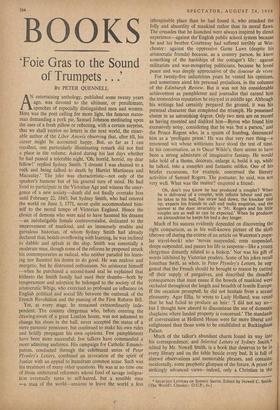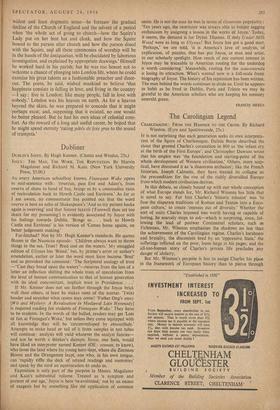BOOKS
`Foie Gras to the Sound of Trumpets . .
BY PETER QUENNELL N N entertaining anthology, published some twenty years ago, was devoted to the ultimate, or penultimate, speeches of especially distinguished men and women. Here was the poet calling for more light, the famous states- man demanding a pork pie, Samuel Johnson meditating upon the uses of a fresh pillow or reflecting, with a certain surprise, that we shall receive no letters in the next world, the miser- able author of the Liber Amoris observing that, after all, his career might be accounted happy. But, so far as I can recollect, one particularly illuminating remark did not find a place in the volume. Asked during his last days whether he had passed a tolerable night, 'Oh; horrid, horrid, my dear fellow!' replied Sydney Smith. 'I dreamt I was chained to a rock and being talked to death by Harriet Martineau and Macaulay.' The joke was characteristic—not only of the speaker's humour but of his general turn of mind. He had lived to participate in the Victorian Age and witness the emer- gence of a new society—death did not finally overtake him until February 22, 1845; but Sydney Smith, who had entered the world on June 3, 1771, never quite accommodated him- self to the moral tempo of Victorian England. Hence the choice of demons who were said to have haunted his dreams —an indefatigable female controversialist, dedicated to the improvement of mankind, and an immensely erudite and garrulous historian, of whom Sydney Smith had already declared that, beside overflowing with learning, he was inclined to dabble and splash in the slop. Smith was essentially a moderate man, though some of the reforms he proposed struck his contemporaries as radical, who neither paraded his learn- ing nor 'flaunted his desire to do good. He was zealous and energetic, but he distrusted enthusiasm. No aristocrat himself —when he purchased a second-hand seal he explained that hitherto the Smith family had used their thumbs—both by temperament and adoption he belonged to the society of the aristocratic Whigs, who exercised so profound an influence on English political and social life between the outbreak of the French Revolution and the passing of the First Reform Bill.
Yet, at every stage, he remained extraordinarily inde- pendent. The country clergyman who, before entering the drawing-room of a great London house, was not ashamed to change his shoes in the hall, never accepted the status of a mere parsonic pensioner, but continued to make his own rules and boldly propagate his own opinions. Few pamphleteers have been more successful; few talkers have commanded a more admiring audience. His campaign for Catholic Emanci- pation, conducted through the celebrated series of Peter Plymley's Letters, combined an invocation of the spirit of Justice with an appeal to humdrum common sense. Such was his treatment of many other questions. He was at no time one of those embittered reformers whose fund of savage indigna- tion eventually turns to self-hatred, but a sensible man —a man of the world—anxious to leave the world a less inhospitable place than he had found it, who attacked the folly and absurdity of mankind rather than its moral flaws. The crusades that he launched were always inspired by direct experience—against the'English public school system because he and his brother Courtenay had suffered terribly at Win- chester: against the oppressive Game Laws (despite his aristocratic friends) because, as a country parson, he knew something of the hardships of the cottager's life : against militarists and war-mongering politicians, because he loved peace and was deeply appreciative of the douceur de vivre.
For twenty-five industrious years he vented his opinions, and sometimes aired his personal prejudices, in the columns of the Edinburgh Review. But it was not his considerable achievement as pamphleteer and journalist that earned him the tremendous reputation he enjoyed in middle age. Although his writings had certainly prepared the ground, it was his personal character that completed the triumph. He possessed charm in an astonishing degree. Only two men are on record as having resented and disliked him—Byron who found him excessively noisy, considering that he was tut a parson,' and the Prince Regent who, in a spasm of humbug, denounced him as a 'profligate priest.' He was that very rare thing—a renowned wit whose witticisms have stood the test of time. In his conversation, as in Oscar Wilde's, there seems to have been a strong admixture of imaginative fantasy. He would take hold of a theme, decorate, enlarge it, build it up, while he talked, into a complex and fantastic edifice. One of his briefer excursions, for example, concerned the literary activities of Samuel Rogers. The poetaster, he said, was not very well. What was the matter? enquired a friend : Oh, don't you know he has produced a couplet? When he is delivered of a couplet, with infinite labour and pain, he takes to his bed, has straw laid down, the knocker tied up, expects his friends to call and make enquiries, and the answer at the door invariably is `Mr. Rogers and his little couplet are as well as can be expected.' When he produces an alexandrine he keeps his bed a day longer.
Much of his success evidently depended on discovering the right comparison, as in his well-known picture of the sloth (thrown off during the course of an article on Waterton's popu- lar travel-book) who 'moves suspended, rests suspended. sleeps suspended, and passes his life in suspense—like a young clergyman distantly related to a bishop.' Nor was his gift of words inhibited by Victorian prudery, Some of his jokes recall Jonathan Swift, as when, in Peter Plymley's Letters, he sug- gested that the French should be brought to reason by cutting off their supply of purgatives, and described the dreadful consequences that must ensue if the bowels of mankind were occluded throughout the length and breadth of hostile Europe. If the occasion prompted, he did not hesitate from a sexual pleasantry. Agar Ellis, he wrote to Lady Holland, was vexed that he had failed to produce an heir: 'I did not say so-- but I thought how absurd to discontinue the use of domestic chaplains where landed property is concerned.' The standards of conversation at Holland House were far more liberal and enlightened than those soon to be established at Buckingham Palace.
Much of the talker's abundant charm found its way into his correspondence; and Selected Letters of Sydney Smith,* edited by Mr. Nowell Smith, is a book that deserves to be in every library and on the table beside every bed. It is full of shrewd observations and memorable phrases, and contains, incidentally, some prophetic glimpses of the future. A priest of strikingly advanced views—indeed, only a Christian in the widest and least dogmatic sense—he foresaw the gradual decline of the Church of England and the advent of a period when 'the whole act of going to church—how the Squire's Lady put on her best hat and cloak, and how the Squire bowed to the parson after church and how the parson dined with the Squire, anfl all these ceremonies of worship will be in the hands of the antiquarian, will be elucidated by laborious investigation, and explained by appropriate drawings.' Himself he worked hard in his parish; but he was too honest not to welcome a chance of plunging into London life, where he could exercise his great talents as a fashionable preacher and diner- out. The poets, he said, wished mankind to believe 'that happiness consists in falling in love, and living in the country —I say : live in London; like many people, fall in love with nobody.' London was his heaven on earth. As for a heaven beyond the skies, he was prepared to concede that it might perhaps exist; and, supposing that it existed, no one would he better pleased. But he had his own ideas of celestial com- fort. As the reward of a long and useful career, he hoped that he might spend eternity 'eating pâtés de foie gras to the sound of trumpets.'



























 Previous page
Previous page